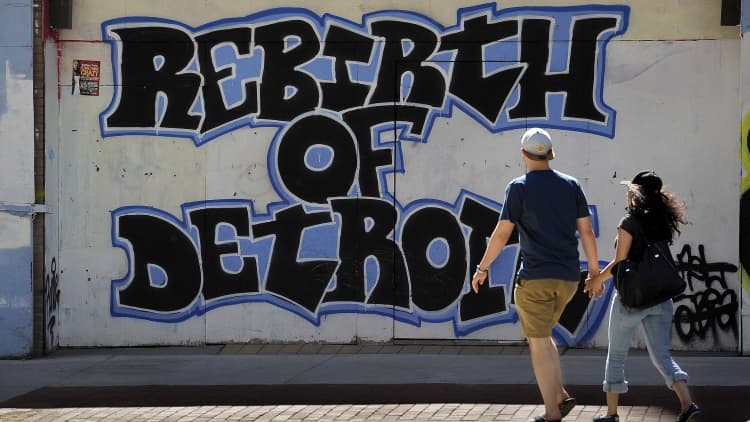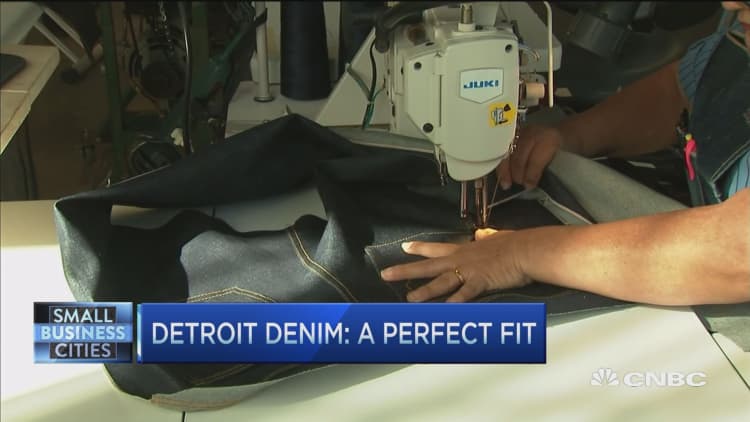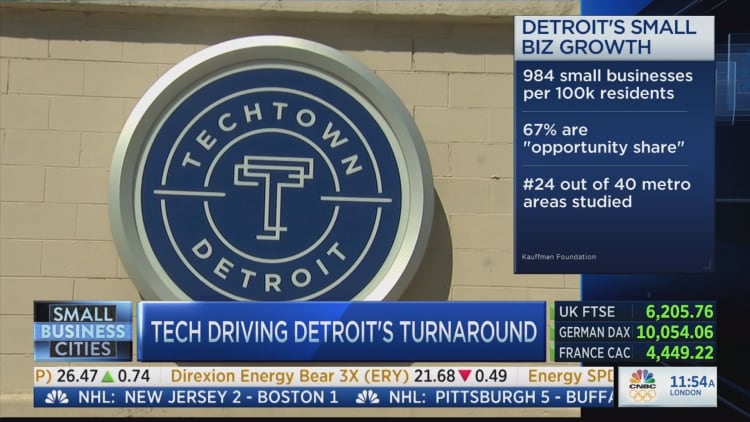


Detroit became the poster child for the damage done by the Great Recession — an auto industry that was completely decimated, topped off with a population exodus and housing collapse, all years in the making. After the largest municipal bankruptcy in U.S. history, Motor City is pushing for a comeback, driven in part by local businesses with a belief in the city's future.
"People complain about not being able to keep up with restaurant openings downtown," said Sandy Baruah, president and CEO of the Detroit Regional Chamber, which notes that since 2013, there has been at least $3.4 billion in investment and development announced in the city, including 125 new restaurants and retail establishments that have recently opened. "There's economic opportunity here. We are seeing people come back into the city to work, live and play."
And many of those people are entrepreneurs. According to the Kauffman Foundation's report "Main Street Entrepreneurship by Metropolitan Area," there are nearly 984 small businesses for every 100,000 residents in the Detroit metro. What's more, the metro ranked No. 24 out of 40 areas studied, and a separate report from the foundation finds nearly 67 percent of small-business owners are launching ventures because they saw the opportunity to do so, not out of necessity.
This is likely due in part to a low-tax environment in the state, at 4.25 percent for individuals and a simpler, more competitive corporate tax at 6 percent.
Revitalizing the city "block by block"
Resources are also plentiful for current and aspiring business owners. TechTown, which is now a nonprofit, was founded in 2000 by Wayne State University, General Motors and Henry Ford Health System and serves as the city's innovation hub. From 2008 through 2015, there have been nearly 1,600 companies served and more than 1,200 jobs created. More than $122 million has been raised in funding by TechTown's companies in that time frame.
TechTown rents space to start-ups, connects them to capital resources and accelerates and incubates companies via several programs with varying focuses, including technology, health care and traditional brick-and-mortar retail. The space is a renovated former Chevrolet facility where the Corvette was designed, and that culture of innovation is still present.
"The biggest opportunity is the low barrier to entry," said TechTown president and CEO Ned Staebler, who added, "You can get up with a relatively low amount of capital due to low real estate costs in a relatively short amount of time."
But half of the businesses leveraging TechTown's resources are not in the technology space. April Anderson of Good Cakes and Bakes is one of the brick-and-mortar businesses working with the TechTown's SWOT City program (Strengths Weaknesses Opportunities and Threats), on accounting and marketing. Anderson's organic and locally sourced ingredients have gained national attention — she's even served Oprah, but it's the people in the community that mean the most to the entrepreneur, who launched her business in 2013.
"People are starting to realize that you need to move out into the neighborhoods. The neighborhoods are what keep a business going," Anderson said. "If the community doesn't buy into you or support you, you won't survive."
Meanwhile, Detroit Denim is drawing on the city's manufacturing background, hand-making denim jeans, aprons and bags in Motor City. Founder Eric Yelsma is a denim enthusiast and collector who decided to turn his hobby into a full-time job after being laid off in 2009 from his corporate job as a chemical salesman.
Detroit Denim is one of the few companies still making jeans in the States. "I couldn't do this anywhere else but Detroit," he said. "It's extraordinarily challenging but extraordinarily rewarding."
He found a partner in Brenna Lane, who answered his ad on Craigslist, looking for a seamstress. Today she runs his production and operations and has equity in the company.
"The most rewarding thing is being able to employ Detroiters," Lane said, noting the company now has seven employees and nearly $300,000 in annual sales. "It's a proud way to make a living, making something with your hands. And we are really good at that here in Detroit."
A work in progress
The city is seeing younger people moving in, and start-up overhead costs are low, helping to facilitate a downtown revitalization, the Detroit Regional Chamber's Baruah said. Two recent big projects include Amazon's announcement last fall to unveil a new corporate office and technology hub in the city in 2016, and Nike's plan to open up a retail location. What's more, since 2009 nearly 227,000 private-sector jobs have been added through the end of 2015, according to the Chamber, citing data from the Bureau of Labor Statistics.
Separately, the 7.2 SQ MI Report from February 2015, covering Greater Downtown Detroit, finds that as of 2014, there has been an increase of more than 100 businesses, including restaurants and outdoor patios, since 2013. Overall, there are 378 restaurants in the city, and residential rental units in both downtown and midtown Detroit were nearly 100 percent fully occupied between 2013 and 2014.
Although Detroit has been given the chance to reinvent itself from the ground up and its population declines have slowed, with an estimated 680,000 residents in July 2014, the most recent year available, Baruah admits that Detroit's comeback is still a work in progress.
"Even with our growth and positive momentum, we have a tremendous way to go before we look like a New York, Chicago or Minneapolis," he said.


